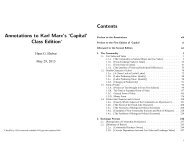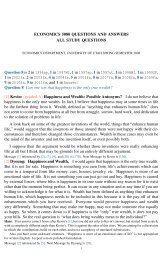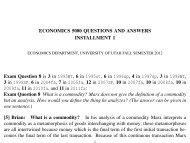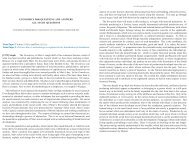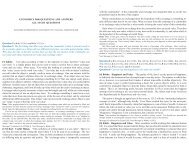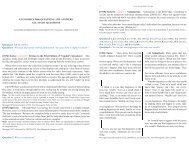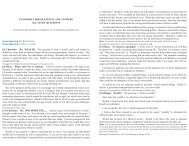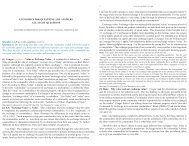Question 1 What did Marx mean with his formu - University of Utah
Question 1 What did Marx mean with his formu - University of Utah
Question 1 What did Marx mean with his formu - University of Utah
Create successful ePaper yourself
Turn your PDF publications into a flip-book with our unique Google optimized e-Paper software.
U <strong>of</strong> <strong>Utah</strong> Econ 5080 2007fa 23<br />
other, they are also not shocked if the price <strong>of</strong> milk in one store is different than the price<br />
<strong>of</strong> milk in a different store – although t<strong>his</strong> diversity contradicts the idea that t<strong>his</strong> is the price<br />
“<strong>of</strong>” milk. To us, t<strong>his</strong> diversity is a familiar every-day occurrence, but when East Germany<br />
switched from a socialist system to a capitalist system, people used to call the radio station<br />
saying: “I just was in two different stores and they sold milk at two different prices; isn’t<br />
one <strong>of</strong> these stores doing something illegal?” Under socialist price controls, they were used<br />
to getting milk everywhere at the same price. T<strong>his</strong> seemed to be natural to them, because<br />
after all it was the same milk, and they were shocked to see that now the same milk was sold<br />
at different prices.<br />
<strong>Marx</strong>’s theory <strong>of</strong>fers here the following explanation: we are not shocked about t<strong>his</strong> contradiction<br />
because we understand that both contradictory aspects have some truth in them.<br />
The exchange-value <strong>of</strong> milk is commonly associated <strong>with</strong> milk and not seen as something<br />
purely relative, i.e., newly generated in the interaction between each buyer and seller, because<br />
it is the exterior manifestation <strong>of</strong> the value <strong>of</strong> milk. T<strong>his</strong> value is indeed closely<br />
associated <strong>with</strong> milk, because it is the socially necessary labor-time to produce t<strong>his</strong> milk.<br />
On the other hand, the variability <strong>of</strong> prices <strong>of</strong> the same good is also accepted because the<br />
sellers compete on the markets. I.e., the value is not set by a direct organization <strong>of</strong> producers,<br />
but the producers produce independently and then let their goods fight <strong>with</strong> each other on<br />
the market. Prices are the results <strong>of</strong> these competitive battles. T<strong>his</strong> does not <strong>mean</strong> that they<br />
are entirely “accidental,” the value still shines through as the regulatory principle since every<br />
producer has similar production costs. In <strong>Marx</strong>’s terminology, prices are the exterior surface<br />
manifestations <strong>of</strong> the intrinsic value, and t<strong>his</strong> manifestation is indeed relative, because it is<br />
the exchange relation between the two commodities.<br />
Chased makes a distinction between the intrinsic quality and its exterior surface manifestation<br />
when he writes: “alas, it is not a question <strong>of</strong> what the worth is, but <strong>of</strong> the exchangevalue.”<br />
But in <strong>his</strong> answer, if I understand it right, the intrinsic thing is the use-value, while<br />
the exchange-value comes from the market power <strong>of</strong> the suppliers who “control” the market.<br />
<strong>Marx</strong> does not believe that use-value has an influence on the price; in the long run, use-value<br />
only has an influence on the quantities supplied. Instead, the intrinsic basis for pricing is the<br />
ultimate cost <strong>of</strong> the commodity to society, which is its labor input. T<strong>his</strong> theoretical disagreement<br />
has important implications: in <strong>Marx</strong>’s theory, value is produced in production by the<br />
workers, while in the neoclassical theory, value is produced on the market by the consumers.<br />
Message [155] referenced by [2010fa:24]. Next Message by Hans is [157].<br />
<strong>Question</strong> 63 is 64 in 2008SP, 64 in 2008fa, 66 in 2009fa, 67 in 2010fa, 61 in 2012fa, and<br />
67 in Answer:<br />
<strong>Question</strong> 63 The French economist Le Trosne wrote that the value <strong>of</strong> a thing consists in<br />
its exchange-proportions <strong>with</strong> other things. Does <strong>Marx</strong> agree <strong>with</strong> t<strong>his</strong>, or how would he<br />
re-<strong>formu</strong>late t<strong>his</strong> proposition to make it correct?<br />
[131] Daru: Le Trosne doesn’t know the difference. Le Trosne’s statment can be broken<br />
in two parts. He first mentions the “value <strong>of</strong> a thing” (and by ‘thing’ we here assume that<br />
he <strong>mean</strong>s a ‘commodity’) and then defines it relative to the exchange proportions <strong>with</strong> other<br />
commodities. <strong>Marx</strong> would not agree <strong>with</strong> t<strong>his</strong> for the simple reason that he defines the two<br />
24 2007fa Econ 5080 U <strong>of</strong> <strong>Utah</strong><br />
concepts differently. Every time <strong>Marx</strong> uses the word ‘value’ he is referring to the congealed<br />
abstract labour expended on the commodity (Hans [105]). Le Trosne on the other hand<br />
suggests that the value <strong>of</strong> a commodity exists only because it can be exchanged <strong>with</strong> some<br />
other commodity/ies. Here to <strong>Marx</strong>, Le Trosne is only talking about the exchange value <strong>of</strong><br />
the commodity and not its value.<br />
The exchange value <strong>of</strong> a commodity for <strong>Marx</strong> is an outcome <strong>of</strong> some social relations<br />
that take pace in the marketplace. The exchange-value only provides producers <strong>with</strong> signals<br />
about the quantity <strong>of</strong> a commodity to be produced. For <strong>Marx</strong>, the value <strong>of</strong> a commodity<br />
makes it exchangeable (Hans [105]). From the last sentence it seems that <strong>Marx</strong> is agreeing<br />
<strong>with</strong> Le Trosne and alludes to the same type <strong>of</strong> connection that Le Trosne has developed<br />
between value and exchange value. It must be noted that <strong>Marx</strong> considers exchange value<br />
to be only a superficial manifestation <strong>of</strong> value. <strong>Marx</strong> believes that although value in its<br />
own right is a social relation stemming from production, he describes exchange-value as<br />
form <strong>of</strong> value (Annotations page 76). Also, I think for him value exists independent <strong>of</strong><br />
exchange value <strong>of</strong> a commodity. The exchange value comes about only in the market place<br />
i.e. only through some social relations that govern trading <strong>of</strong> commodities. If a commodity<br />
is produced and consumed <strong>with</strong>out being traded then it still contains value i.e. the congealed<br />
abstract labor inside it. <strong>What</strong> it would not have is an exchange value since it has not been<br />
put up for trading. Le Trosne’s statment on the other hand implies that if commodities are<br />
not traded then they will not contain any value—an argument that <strong>Marx</strong> would not find<br />
palatable. In summary, exchange value comes about due to social relations taking place<br />
on the surface, whereas the value <strong>of</strong> a commoditiy exists due to the social relations that<br />
exist behind the surface phenomena. T<strong>his</strong> is a crucial distinction to <strong>Marx</strong> that Le Trosne’s<br />
statment completely seems to miss or ignore.<br />
Hence, if <strong>Marx</strong> were to rephrase Le Trosne’s statment he probably would have said ‘the<br />
value <strong>of</strong> a commodity exists because <strong>of</strong> the congealed abstract labour present inside it.’ or<br />
‘the value <strong>of</strong> a commodity makes it exchangeable.’<br />
Hans: Very good, just one quibble: if the product is never traded but consumed by the producer then it is not<br />
a commodity and has no value. The difference between <strong>Marx</strong> and Le Trosne is whether value is produced in<br />
production (<strong>Marx</strong>) or in the market (Le Trosne).<br />
Message [131] referenced by [208] and [263]. Next Message by Daru is [256].<br />
[147] Caroline: <strong>What</strong> exactly is being traded for t<strong>his</strong> Thing. A thing, or a commodity,<br />
in Le Trosne’s view is only valuable in relation to other commodities. <strong>Marx</strong> would probably<br />
dissect Le Trosne’s proposition, and disagree <strong>with</strong> part <strong>of</strong> it, because there are more values<br />
in a commodity than just its “exchange-proportions <strong>with</strong> other things” (Hans’ annotations,<br />
pg. 22).<br />
Le Trosne does not specify what is actually being traded. <strong>What</strong> does one consumer<br />
see in a commodity that drives them to exchange or purchase it? “The value <strong>of</strong> a thing<br />
consists in its exchange-proportions,” but t<strong>his</strong> begs for more interpretation. <strong>Marx</strong> would<br />
probably argue that the exchange proportions <strong>of</strong> a thing, or commodity, consists <strong>of</strong> usevalues,<br />
as well as its exchange values. They are interrelated, as <strong>Marx</strong> says in question 75 <strong>of</strong><br />
the annotations: “exchange-relations are characterized by an abstraction from use-values...if<br />
use-value is in high demand,...then it commands a higher exchange-value.” Also, on page 18<br />
<strong>of</strong> the annotations, there are explanations as to how they are related, but also independent in



